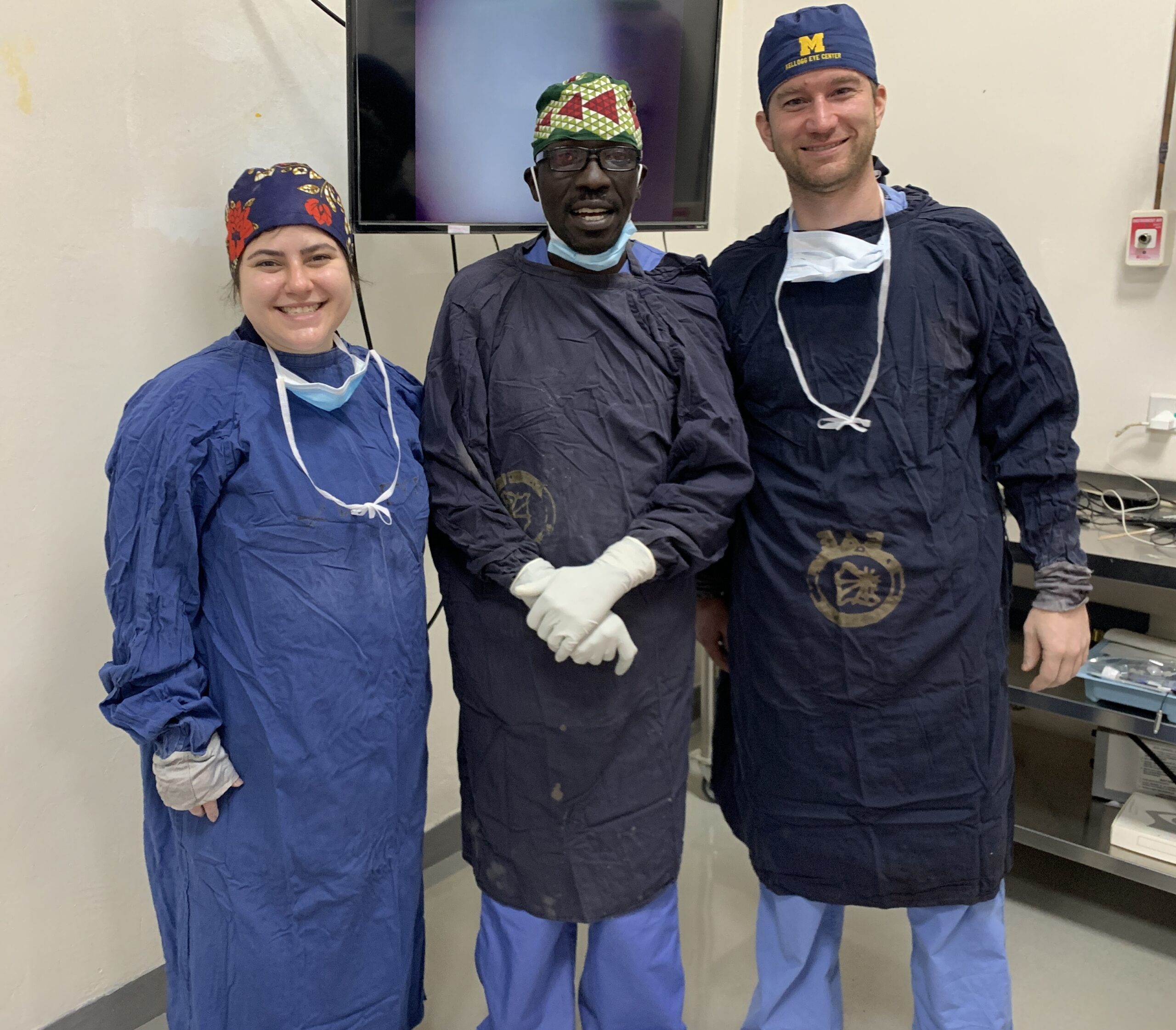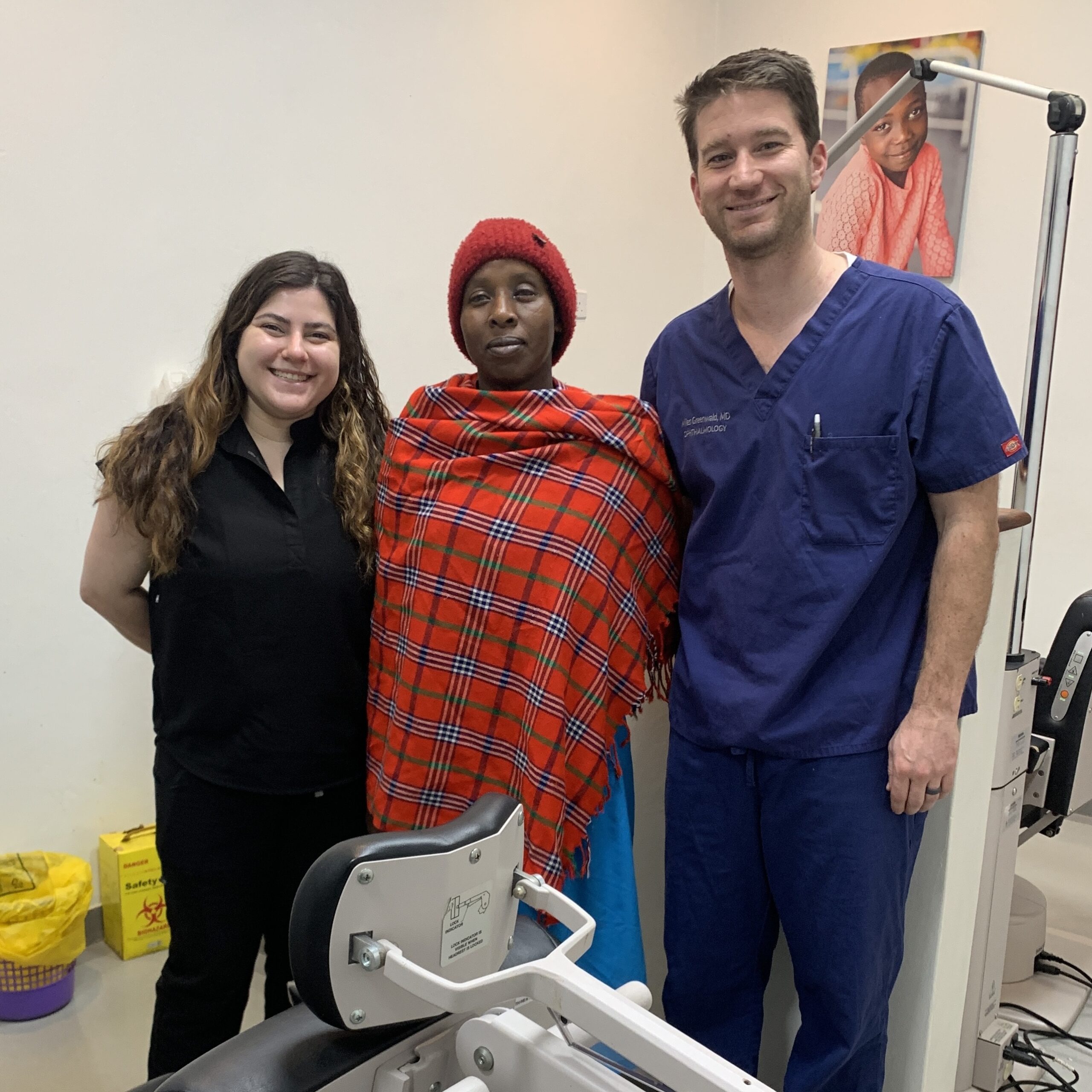M
Leave a Legacy of Giving
You can support our mission of changing lives by saving sight in multiple ways!
At Saving Sight, our vision is to be the global partnership model for how eye banking and charitable vision services can most effectively serve people and communities. This standard we hold ourselves to has guided us to over 60 years of excellence in eye banking. We wouldn’t be able to change lives by Saving Sight without the support and dedication of our corneal surgeon partners. One corneal surgeon partner has a history of Saving Sight in the United States and globally.

Sara Krachmalnick, Senior Ophthalmology Resident at KU, Dr. Ben Roberts, Ophthalmology Specialist at Tenwek Hospital in Kenya, and Dr. Miles Greenwald, Ophthalmology Specialist
Dr. Miles Greenwald started at the University of Kansas Medical Center in September 2023, focusing on corneal surgeries and comprehensive eye care. Before KU, Dr. Greenwald completed a one-year cornea fellowship before participating in a Global Ophthalmology Fellowship at the University of Michigan. The Global Ophthalmology Fellowships aims to build skills and relationships with different hospitals and clinics in the developing world. Often, there are fewer professionals, nurses, and technicians, and their resources are a lot less.
Dr. Greenwald spent seven months of that year traveling to different countries, working with the local ophthalmologists to determine how best to provide eye care. Dr. Greenwald spent time in India, Rwanda, Honduras, and two places in Kenya.
Just a few months ago, Greenwald traveled back to Kenya on a mission trip to save sight and teach and train the next generation of corneal surgeons. Coming out of the Global Ophthalmology Fellowship, he knew he wanted to work in an academic ophthalmology department, and that is what KU provided.

Sara Krachmalnick, Senior Ophthalmology Resident at KU, and Dr. Miles Greenwald, Ophthalmology Specialist
“I knew that I wanted to work with residents and medical students and be involved in training and teaching the next generation how to be good ophthalmologists and doctors. I’ve been very fortunate throughout my training to have learned from just amazing, amazing people and have mentors who have devoted so much to training me and helping me be the best that I can be. And so, I wanted to be involved in that as part of my career,” Greenwald said.
Before his trip, Greenwald connected with the ophthalmologist in Kenya and discussed what he could do and what the resident could do to be most helpful. The ophthalmologist said that people are on the waiting list for cornea transplants. After hearing this, Greenwald connected with Saving Sight to see how we could partner with him and save sight.
“Saving Sight was super supportive. They just said to tell us the details. How can we help logistically? How can we help get these patients taken care of? How many tissues would be helpful?” Greenwald said.
In a week, Greenwald and the team completed 12 corneal transplants with tissue provided by Saving Sight. Patients ranged in age from as young as 20 to patients in their 60s. “One of the crucial pieces for collaborations in corneal transplants is the lifelong care that is needed… I can trust Dr. Ben Roberts and his team at the eye hospital that when we do the surgery during that one time period, he and his team are there year-round and are able to care for the patients and do all the post-op care for the transplants,” Greenwald said.
Eye banking is something we take for granted here in the United States. Kenya only has one eye bank, which only processes a little tissue. It is difficult, if not impossible, for physicians in Kenya to get tissue from that eye bank.
“So, working with Saving Sight to have the tissues for the trip would be impossible without Saving Sights support. It makes it possible to restore vision for these patients and to try and give them their livelihood and their lives back,” Greenwald said.
Greenwald says the support he and other doctors within different specialties receive from leadership at KU has been invaluable in making his dream a reality.
“I’m excited for it to continue to build and become kind of a regular thing for the faculty and the residents to be involved in,” Greenwald said.
He plans a trip to Honduras, where he will work with a few ophthalmology surgical fellows, teaching them how to do some advanced surgeries, including corneal transplants and glaucoma surgery. The goal of his trip to Honduras is not for him to do another corneal transplant but to help the young surgeons learn how to do it for themselves.
Corneal blindness is a problem everywhere in the world. It’s estimated that about 4 million people worldwide are legally blind from corneal blindness.
“That number can be easily daunting, and I think we can get numb to it when there are statistics like that. Each of those people has a life dramatically affected by the lack of vision. Being able to partner with Saving Sight to do these surgeries and provide the appropriate follow-up care and post-operative management for each patient and to be able to help restore their sight and regain their life is rewarding.”